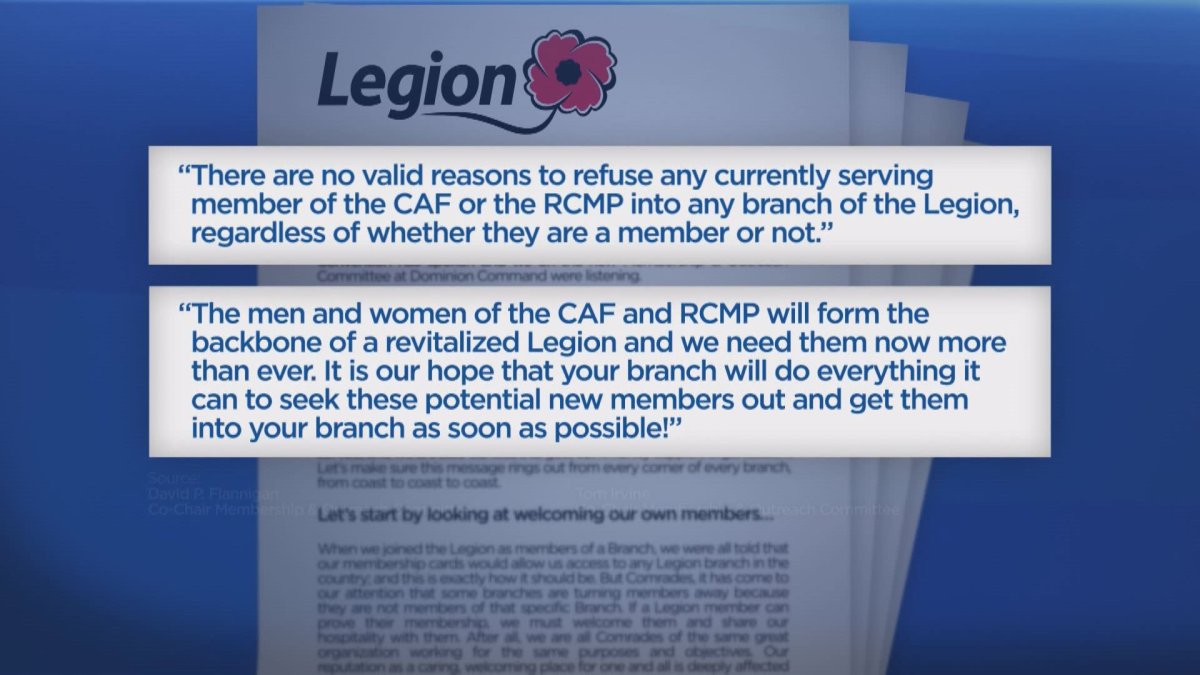Every Thursday night at a Cage aux Sports in Ville St. Laurent, there gathers an exclusive club.

They call themselves Veterans DND Canada, a group co-founded by Hugh Lawson, a Montreal army veteran, to help others like them.
“It’s to help those dealing with PTSD or any emotional issues,” he said. “Or for people who just want to get back in touch with what they lost when they got out of the military.”
Many vets miss that camaraderie and the group helps rekindle some of those feelings with others of like mind.
But there is one organization that was formed a while ago, to do just that.
The Royal Canadian Legion was founded in 1926 to lobby for the needs of veterans returning from the first world war. That service expanded to include other veterans, including those who’ve never been to war.
But nowadays vets increasingly don’t see themselves in the legion. Lawson says it’s not the entire organization that’s failing them.
“It’s not the military part of the legion that’s letting us down — it’s the civilians that don’t understand.”
One of the biggest complaints they have is the number of civilians who are now members. Though most of them mean well, they’re not making the Legion enough of a home for those who’ve served Canada because they don’t understand the military culture.
“There’s a very strict disconnect between what they do, and what we do,” Lawson says.
Also, because of this disconnect, they don’t always provide the services that veterans need — like enough support for those who suffer from PTSD.
Tom Irvine is first vice-president of the Royal Canadian Legion. He admits that there are only a handful of vets at some legion branches, but he insists — that if it wasn’t for the civilians many branches would’ve closed, as older vets pass away.
“Your grandfather’s branch was in need of people to work — people to man the bar, to do the poppy season, whatever. So the family members stepped up.”
As a veteran himself, he agrees that some branches need to be more accommodating to vets. “But it’s 90 years old and it takes a long time for us to change.”
In fact, he wrote an open letter on the Legion’s website saying just that.
There are vets who say that unless the organization addresses theses problems it risks becoming obsolete. But it’ll take a lot of work.
“If their membership is going down, I think they have to find a way to bring people back in,” says Gilbert Tordjman, a former Canadian Army medic, “and it’s not easy for any enterprise.”
Irvine says they are trying to address some of the concerns, asking the branches to modernize and reach out to younger vets.
“We’ve been really pushing it to attract our modern-day veterans through social media, through Twitter, through all the various forms that are available to us,” he says.
He thinks they are making progress and that the attrition is slowing.
Lawson still believes the Legion can become relevant again, but he is cautious.
“They have a long way to go before they get back the confidence and faith of the veterans — especially the modern veterans.”


Comments